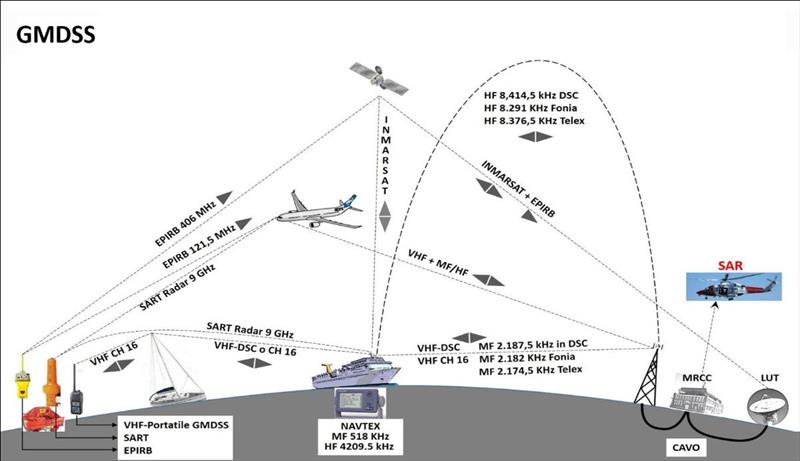
Global Solo Challenge - Who would you call in an emergency?
by Dave Proctor 31 Oct 2022 09:49 PDT

GMDSS architecture © Global Solo Challenge
In this article, I will examine some of the safety telecommunication systems and requirements which will be available to the skippers of the 2023/2024 Global Solo Challenge (GSC).
Before the mid-nineteenth century, the only realistic way one vessel could talk to another vessel or shore station was by the use of signalling flags or by semaphore (again using flags). This was of course by a line of sight only.
In 1844, Samuel Morse invented the Morse code, using a pattern of dots and dashes to denote the letters of the alphabet. This enabled vessels to use signalling lanterns at night or mirrors, reflecting the sun in daylight, to speak to each other.
Also, at about the same time the first pyrotechnic maritime flares were introduced, which assisted rescuers to locate any vessel in distress.
Over the years, Morse code remained the main means of signalling, though the use of lights tended to be replaced with morse code over the radio.
Amazingly even though morse radio signals were around earlier, it was 1912 before a standardised international emergency frequency of 500mhz was adopted. Before this ships would only use their own company's frequency. This change came about after the sinking of the RMS Titanic.
Indeed up until 1988, the distress maritime system relied on Morse code on 500kHz (MF) and voice radiotelephony on Channel 16 (VHF) and 2182kHz (MF). However, it should be noted that for long-distance communications (HF) the dots and dashes of morse survived interference and radio static much better than the human voice.
In the modern era, maritime communication systems have developed (e.g. automated electronic messaging systems and satellite telephony), as have the available infrastructure (e.g. geostationary satellites for Global positioning).
In 1988, the Global Maritime Distress and Safety System (GMDSS) was introduced by the International Maritime Organisation (IMO) under the wing of the Safety of life at sea (SOLAS) convention.
These rules carry the weight of an international treaty.
To assist me in fully understanding these obligations, I spoke to a former Royal Navy communications expert and latterly an Instructor and Examiner of the GMDSS syllabus - Ian Stairs.
Continue reading the full article here...